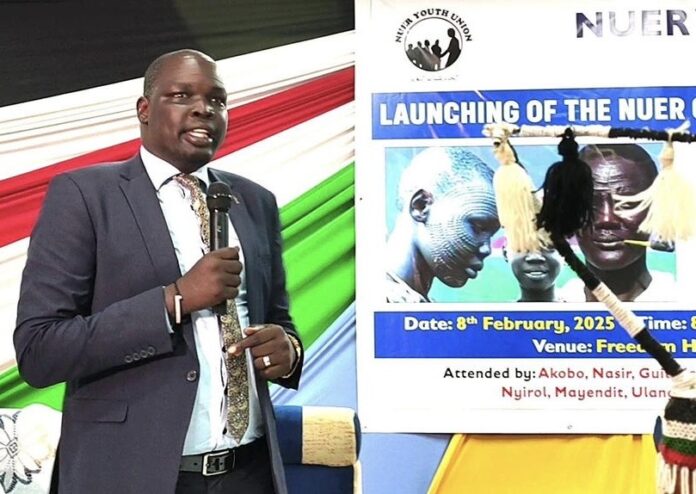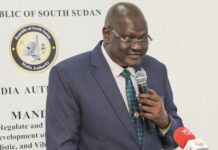Author: Kuol Kum, PhD Candidate at MUBs
The Republic of South Sudan has a fundamental right to self-defense when it comes to foreign invasion to defense their territorial integrity right of the land regardless of our internal conflict.
The Uganda government take advantage of our internal conflict to the extent of Uganda’s administrative expansion to Sudan territories after A 1914 Order of the British Secretary of State for the Colonies remains the only legal definition of the boundary, despite geographical inaccuracies and its problematic use of ‘the southern limits of the Kuku tribe’ to define part of this stretch.

South Sudan lawmakers in EAC should raise a motion to discuss this matter at EAC parliament and asked Uganda government on why did they encroached to the territories belong to another nation, and why are they not abided by 1914 boundary?
If they are not satisfied with this boundary demarcation then there’s procedures to be follow, either through formation of joint committee both Uganda and South Sudan lawmakers to undertake historical evidence of tribe’s settlement or an international court arbitration as a mean to resolve border disputes.
Instead of using forces to exploited other states, this approach can jeopardize the peaceful co-existence between South Sudan and Uganda communities who are living peaceful.
Hence, the countries portion tribes shouldn’t be an advantage to encroached into another territories, and it’s not happened in South Sudan, Uganda and Rwanda having the same countries potion tribes, the same to Ethiopia and South Sudan and no such encroachment emerged at the border areas.
Why Uganda government utilized share tribe as mean to exploited South Sudan to that extent? Simple because Uganda intruded into South Sudan’s affairs beyond bilateral agreement, South Sudanese must stand tall to defense their territorial integrity and denounce any bilateral agreement that undermined our sovereignty right.
“Our history remains intact as resilience societies despite the numerous challenges surface our nation, these are internal issues can be resolve gradually and we should not compromise our fundamental rights and it’s also against British colonial demarcation which provided the clarity on border states.”
The British were engaged in their own attempts at such mapping and decided in 1911 that the new boundary between the Anglo-Egyptian Sudan and the Uganda Protectorate ‘should be a tribal one. To the west of the Nile, the subsequent Boundary Commission was instructed to identify a line that would separate Bari language-speakers, that is Kuku and Kakwa, from the Madi and Lugbara, despite a Ugandan report of close relations between Kuku and Madi.
The first British administrator in Kajokeji, Captain Chauncey Stig and, was particularly fond of stereotyping entire tribes, and had already decided in 1911 that the Kuku around his headquarters were of a peaceful disposition while the Madi were a treacherous and cowardly people.
He also reported that the Kayu/Ayo stream was the boundary between the Madi and Kuku tribes a definition that would be included in the Commission’s decision.
Yet in a more detailed account published posthumously, Stig and noted the very recent migrations in the area (reporting that some Kuku had previously lived south of the Kayu stream), and the ethnic ‘mixture’ in many areas. Captain Kelly, Chief Commissioner of the Sudan–Uganda Boundary Commission, casually acknowledged that creating a tribal boundary might necessitate ‘the transplanting of a few villages and should remain with the officials conversant with actual local conditions to arrange the exact line which will most conveniently separate the mixed population.
Despite this presumptive confidence in the colonial capacity for territorial reorganization, he admitted that the boundary recommended is not based on first-hand knowledge.
The Sudan Director of Surveys suggested that a definite settlement should stand over until a reliable map has been prepared’ and the Sudan government therefore only agreed to the publication of the Uganda Order on 21 April 1914 as a provisional measure.
The Uganda Government have violated the twenties under international laws on boundaries disputes settlement.
In according to the twenties govern boundaries disputes, in the event border disputes arise, several provisions and mechanisms can be applied under international law to address them.
These include negotiation, mediation, arbitration, and judicial settlement, with the specific approach often depending on the nature of the dispute and the willingness of the parties to cooperate. The principle of pacta sunt Servando (agreements must be kept) is fundamental, meaning treaties and agreements establishing borders should be respected.
Additionally, the concept of uti possidetis juris is often applied, particularly in decolonization contexts, to validate existing administrative boundaries as international borders. In this regard, there’s a need for IGADA and EAC for their intervention on this unlawful encroachment from the government of Uganda and call for their immediate cessation of hostility within South Sudan territories without precondition.
The People of South Sudan are generous enough in the extent by allowing the Uganda government trespassed into their own affairs which undermined our sovereignty integrity. The South Sudan should not be basis to exploit our resources by Uganda government in the pretext of protecting government facilities.
South Sudan Lawmakers in EAC can withdraw from Parliament.
The South Sudanese lawmakers in EAC parliament should consider their withdrawal from EAC assemble since the parliament is not condemning the unlawful encroachment from the government of Uganda into South Sudan territories with military aggression which undermined EAC protocols on boundaries management within EAC states.
“We thought the EAC can address such unlawful encroachment and hold Uganda governemtn accountable for their action and respect the East African Community (EAC) focuses on regional integration through various protocols, including those addressing boundaries and related issues.”
The EAC recognizes the importance of managing shared ecosystems across borders, such as Lake Victoria. The EAC Secretariat is working to harmonize policies for managing these resources.
The Transitional National Legislative Assemble should consider the formation of joint committee to task for border demarcation across South Sudan borders to avoid unlawful encroachment from our neighbor states.
“It’s very unfortune that we don’t have a control on our natural resources as a results of uncontrolled borders, our animals do migrated daily basis to our neighbors states and we don’t have a capacity to manage their movement at the border and these are useful resources to development our country, these resources are fundamental to development, providing the foundation for economic activity, environmental stability, and human well-being.”
They are essential for various sectors, including agriculture, industry, and energy production, and their sustainable management is crucial for long-term economic growth and environmental health. Effective resource management is vital to ensure that development is sustainable and equitable, benefiting both present and future generations.
The author Kuol Kum is a concern South Sudanese. He can be reached for more information through his email at kumchany@gmail.com





